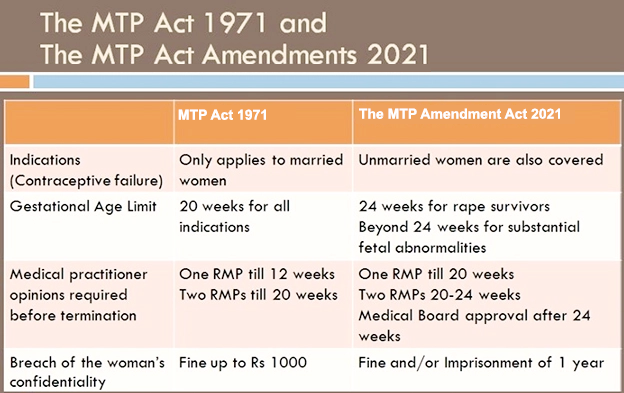Social Justice
Medical Termination of Pregnancy (MTP) Amendment Act, 2021
- 04 Aug 2021
- 7 min read
Why in News
Recently, the Delhi High Court has allowed the medical termination of pregnancy of a woman who had completed 22 weeks of gestation as the foetus was suffering from multiple abnormalities.
- Gestation is the foetal development period from the time of conception until birth.
- In India, the Medical Termination of Pregnancy (MTP) Act stipulates a ceiling of 20 weeks, for termination of pregnancy, beyond which abortion of a foetus is statutorily impermissible.
Key Points
- About MTP Act:
- The Medical Termination of Pregnancy Act, 1971 (“MTP Act”) was passed due to the progress made in the field of medical science with respect to safer abortions.
- In a historic move to provide universal access reproductive health services, India amended the MTP Act 1971 to further empower women by providing comprehensive abortion care to all.
- The new Medical Termination of Pregnancy (Amendment) Act 2021 expands the access to safe and legal abortion services on therapeutic, eugenic, humanitarian and social grounds to ensure universal access to comprehensive care.
- Key Provisions of the MTP Amendment Act, 2021:
- Termination due to Failure of Contraceptive Method or Device:
- Under the Act, a pregnancy may be terminated up to 20 weeks by a married woman in the case of failure of contraceptive method or device. It allows unmarried women to also terminate a pregnancy for this reason.
- Opinion Needed for Termination of Pregnancy:
- Opinion of one Registered Medical Practitioner (RMP) for termination of pregnancy up to 20 weeks of gestation.
- Opinion of two RMPs for termination of pregnancy of 20-24 weeks of gestation.
- Opinion of the State-level medical board is essential for a pregnancy to be terminated after 24 weeks in case of substantial foetal abnormalities.
- Upper Gestation Limit for Special Categories:
- Increases the upper gestation limit from 20 to 24 weeks for special categories of women, including survivors of rape, victims of incest and other vulnerable women (differently abled women, minors, among others).
- Confidentiality:
- The “name and other particulars of a woman whose pregnancy has been terminated shall not be revealed”, except to a person authorised in any law that is currently in force.
- Termination due to Failure of Contraceptive Method or Device:
- Significance:
- The new law will contribute towards ending preventable maternal mortality to help meet the Sustainable Development Goals (SDGs) 3.1, 3.7 and 5.6
- SDG 3.1 pertains to reducing maternal mortality ratio whereas SDGs 3.7 and 5.6 pertain to universal access to sexual and reproductive health and rights.
- The amendments will increase the ambit and access of women to safe abortion services and will ensure dignity, autonomy, confidentiality and justice for women who need to terminate pregnancy.
- The new law will contribute towards ending preventable maternal mortality to help meet the Sustainable Development Goals (SDGs) 3.1, 3.7 and 5.6
- Issues:
- Different opinions on Termination:
- One opinion is that terminating a pregnancy is the choice of the pregnant woman and a part of her reproductive rights while the other is that the state has an obligation to protect life, and hence should provide for the protection of the foetus.
- Across the world, countries set varying conditions and time limits for allowing abortions, based on foetal health, and risk to the pregnant woman.
- Not allowed beyond 24-weeks:
- The Act allows abortion after 24 weeks only in cases where a Medical Board diagnoses substantial foetal abnormalities.
- This implies that for a case requiring abortion due to rape, that exceeds 24-weeks, the only recourse remains through a Writ Petition.
- Abortion to be performed by doctors:
- The Act require abortion to be performed only by doctors with specialisation in gynaecology or obstetrics.
- As there is a 75% shortage of such doctors in community health centers in rural areas, pregnant women may continue to find it difficult to access facilities for safe abortions.
- The Act require abortion to be performed only by doctors with specialisation in gynaecology or obstetrics.
- Different opinions on Termination:
Way Forward
- It is commendable that the Central Government has taken such a bold stand while balancing the diverse cultures, traditions and schools of thought that our country maintains, however the amendment still leaves women with various conditionalities, which in many cases become an impediment in access to safe abortion.
- In Justice K.S. Puttaswamy (Retd.) vs. the Union Of India And Others (2017), the court recognized the constitutional right of women to make reproductive choices, as a part of personal liberty under Article 21 of the Indian Constitution, which, despite laying a robust jurisprudence on reproductive rights and the privacy of a woman, does not translate into a fundamental shift in power from the doctor to the woman seeking an abortion.
- The government needs to ensure that all norms and standardised protocols in clinical practice to facilitate abortions are followed in health care institutions across the country.
- Along with that, the question of abortion needs to be decided on the basis of human rights, the principles of solid science, and in step with advancements in technology.
- Since it has now become an act, one can be assured that the country is on the road to advancement, addressing women issues more fiercely than ever.







